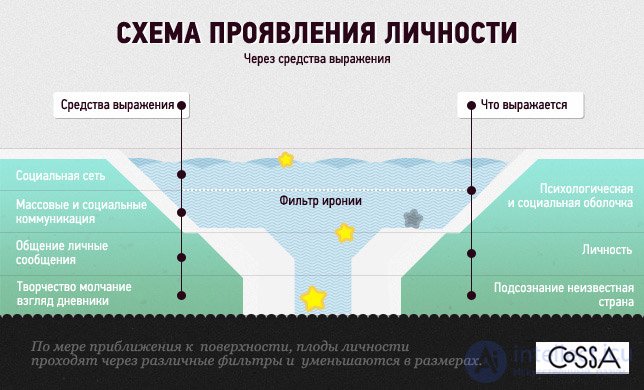Lecture

Marcel Proust wrote that every person is a resident of an unknown country.
Sometimes it can be seen when a person is not covered with social masks or a grimace of habit, when he is at zero point, free from circumstances and roles.
Unknown country is not expressed in social networks. It can be expressed in personal messages, but in public posts a person is almost always on the surface of himself. In social networks you need to try very hard to understand, see and gather facts about an unknown person’s country.
We see deception - instead of an unknown country, a well-known country is expressed - statuses, some videos, superficial comments. This happens because of the patterned construction of social networks. In LJ, everything is “amorphous” - here’s a clean sheet, express, read, understand. After reading the LiveJournal of some people, you can feel and grasp the boundaries of that very unknown country.
Those people who judge others by their profiles should understand that the current state of the mechanisms of expression in social networks teaches contempt and a superficial look. It does not teach admiration or surprise.
Social network - public space. In any public space, filters are put on a person’s expression — filters of irony, social roles, masks, and sometimes even harsh sarcasm.
The most powerful filter on the Internet is the irony filter. Being alone with his thoughts, his inner world before the electronic service, a person at the same time understands that many people can see his records and manifestations of his personality. And in order not to become bare, not to allow outside views into the secret space of a person, not to look weak and frank, a person passes his messages through a filter of irony.

A well is a man. It has several layers. As they get closer to the surface, the fruits of the personality pass through various filters and decrease in size. The two-dimensional scheme in no way pretends to the fullest description of a person, it only gives reason to think and imagine a person in projection through the means of expression.
Irony is a powerful tool on the Internet. It is a mirror for readers. A person writes, reflecting on his personality, and the reader finds in his writing some manifestations.
As the Russian philosopher Nikolai Berdyaev noted, every person has a secret and there is a secret. The secret can not be revealed. One can only peer into it, one can only strive towards it. The man himself reveals his secret all his life. The secret is interesting, I want to unravel it, it lies under the lock, the key to which can be picked up. The secret can even be specifically created to attract others. The secret attracts, and it’s easy to fall in love. Mystery beckons.
Quantization of information and reduction of time for perception of a message leads to the fact that people no longer correctly perceive the meanings of some messages.
To understand the meaning of the message you need to delve into your impressions of the message. And there may be several options.
1. The person did not have enough attention and time to even perceive the message (he flipped through the news feed, did not listen to the news, ran to the meeting).
2. The message is perceived, but the person did not go deep into the impressions of the message.
3. The man perceived the message and became absorbed in the impression of it.
When people do not delve into their impressions, they become victims of speed. Instead of extracting their own meaning, they lend themselves to an external explanation of the world.
One can imagine that the world revolves around a person and provides ready-made solutions and definitions to any question that arises. And because of their habits, people are beginning to use ready-made, not their own, but created medium, definitions.
And there is one danger in this - when people use ready-made definitions, these definitions are linked to their psychological world, and settle inside like heavy metal balls.
A person who has stopped at someone else’s ready-made solution will be hard to convince in other similar cases.
In the modern world, the one who can read big texts and write short ones will benefit.
Media directors are faced with the task of how to convey a deep meaning with the help of a small message. If the message is text, the task is difficult to solve.
Story is a new message format. With the help of it you can transfer a whole range of thoughts in one short message. This is done using the features of the message to spread in different directions in the semantic space and dynamically change.
Each story message has links to other messages - it turns out a chain of stories that grows into the past. Each story has lateral associative links - we get branches of meanings that you can travel along and which cannot be conveyed in one sentence.
This structure solves the problem of quickly understanding a short message. Once the entire Internet has filled in the fragments of meanings and the overall picture is clear, only if you have been reading the message feed for a long time, the format of the drop-down message reduces the threshold for understanding the meaning.
And what else is interesting - as a result, we get a dynamic message that is constantly changing. It itself does not change, but its environment changes. Our previous entries are no longer dead weight in the archives, but are woven into the picture of the present. And, secondly, they themselves change, as new thoughts and associations are attached to them. Such a lively tangle.
Using the story, you can get closer to convey the tangle of impressions that a person is experiencing, and associate it with past and future states.
For all this, new message communication tools are needed. Tags - this is the old bones of the Internet.
I want you to feel the same thing that I feel. This is one of the motives for communication in social networks is often defeated due to lack of funds.
In social networks, people do it every day — they post videos, music or statuses on the walls. But it is not always possible to accurately catch intonation.
How to transfer or save a complex emotion on the Internet?
Works of art, according to the ancient Greeks, are not created in order to stand in front of them with their mouths open and say “Ah!” In the tragedy, something is played that for the first time creates feelings in a person that cannot be generated simply by nature. Works of art are consoles for people through which people become people. Passing through the structure of drama, a person creates in himself what he cannot feel in his usual state.
Stories and works of art work like meat grinders - passing through them, a person comes out with new feelings and a renewed understanding of himself and the world.
Is it possible to create such a message format in order to convey a complex emotion to them alone? Or fix the entire emotional background of the day or the moment? To create a message in the message that produces a work, passing through which, in another person, will be born those feelings and emotions that the creator of the message meant?
There will be involved and selective perception of man, and the outside world, and the world of associations.
Emotion as a result will be difficult, and for each person it will be different due to the difference in perception, but some moments will coincide.
Socrates and Plato studied thinking and stumbled upon the task that some truths are not drawn in the usual logical way.
That is, some concepts cannot simply be reached by reasoning logically how to get from a point, And to point B. The Greeks believed that some truths can only be induced.
Socrates thought there are truths that can only be inspired. That is, you can enter a person into such a state, as a result of which a person will be stretched by different truths in opposite directions, will be broken by contradictions, and then his own understanding will be born in him and from despair he will jump into truth.
The Greeks in general believed that it was impossible to directly think, one could only direct a producing thought — an idea not about some specific content, but an idea creating a source of other thoughts.
We cannot receive thoughts simply by directing our will and consciousness forward, because there is a leakage of one moment of time from another, one content from another. Socrates and Zeno said that we cannot directly create, but we can create conditions that create thoughts.
That is, to put consciousness in such conditions that will be woven from contradictions, and, holding them, as a result, induce the truth.
What if all previous calculations apply to the media space? Create a single field in which you can place all media messages, even contradictory ones, and allow a person to go through all this. Is the desired emotion or state then induced?
1. You can draw a path where it is clear in what sequence it is best to go.
2. The service can be used both for sending a message and for diary entries - save different media impressions per day. It is even possible to create a program that will create such cards based on the history of a person in social networks and his behavior on the Internet.
3. All media objects on the map are either links or full-fledged media formats.
4. Now, perception is doing the same thing, only for perception, you have to track the sequence of messages in one tape, and then everything is at the same time.
5. Futurologists talk about a new profession - a media manager - a person who does not create anything himself, only distributes messages in the right order to create new emotions. Similar programs can be created in the future.
Read more: http: //www.cossa.ru/articles/234/14115/
Comments
To leave a comment
SMM Social Media Promotion
Terms: SMM Social Media Promotion